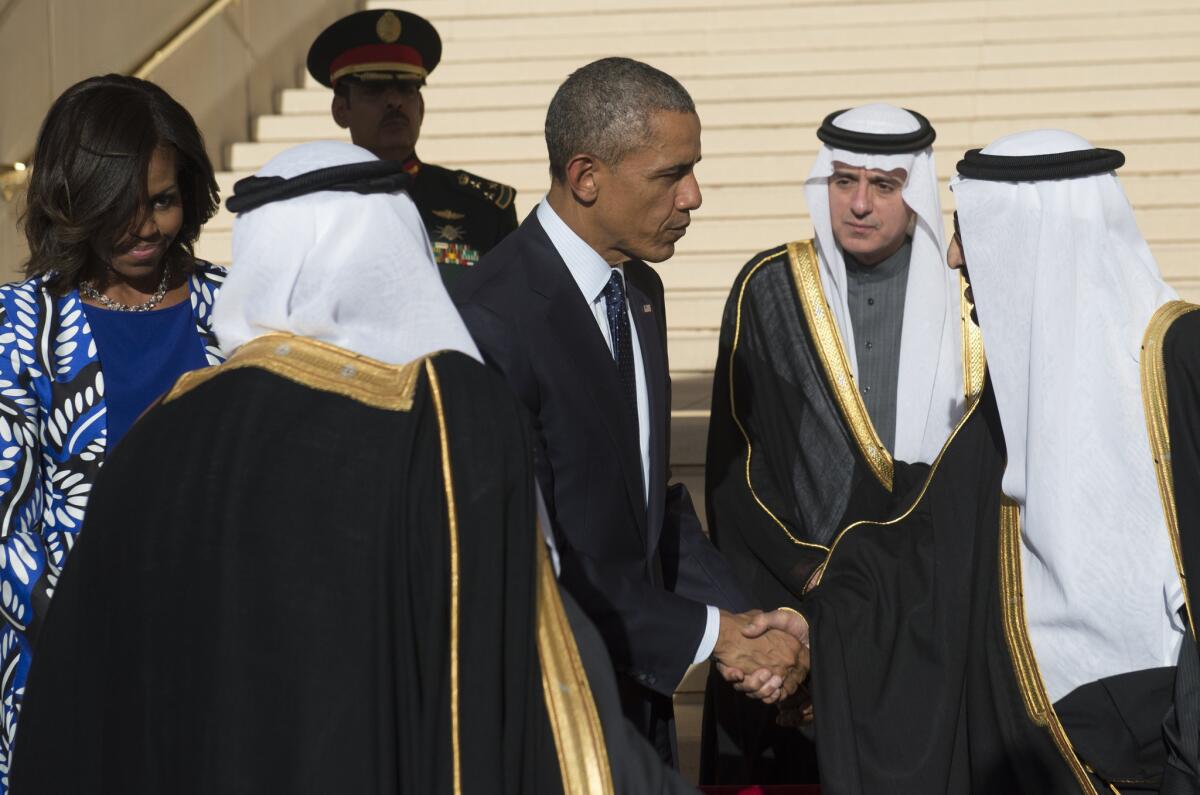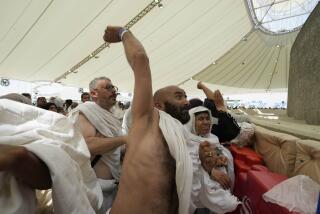Obama, senior delegation meet with Saudi Arabia’s King Salman

President Obama dashed from India to Saudi Arabia on Tuesday in a hastily planned trip aimed at setting out on the right foot with the new leader of a key ally.
Obama cut short a visit in India to be one of the first world leaders to meet with King Salman since the death Friday of his half brother King Abdullah, who was 90. Obama arrived in Riyadh with a large bipartisan delegation of U.S. dignitaries and officials.
King Salman, a sword-bearing guard and members of the royal family greeted the president at the airport.
The trip served as a reminder of the importance of the U.S. relationship with the kingdom. Despite a boon in domestic fuel production and major shifts in the geopolitics of the Middle East, the Saudis are still viewed as a linchpin to U.S. goals in the region, including a nuclear deal with Iran, a credible coalition in the fight against Islamic State and counter-terrorism efforts in a rapidly destabilizing Yemen.
“It is important for us to take into account existing relationships, the existing alignments within a very complicated Middle East,” Obama told CNN’s Fareed Zakaria in an interview aired Tuesday.
Obama was close to King Abdullah, deputy national security council advisor Ben Rhodes told reporters on the way to Riyadh.
“It will be important for the president to establish that relationship with King Salman,” Rhodes said.
The president was joined by a 29-member delegation of current advisors as well as officials from earlier administrations who worked closely with the royal family, the White House said. The list included three former national security advisors and two former secretaries of State, James A. Baker III and Condoleezza Rice.
Sens. John McCain (R-Ariz.) and Mark R. Warner (D-Va.), as well as House Minority Leader Nancy Pelosi (D-Calif.) also made the trip, as did Obama’s secretary of State, CIA director, national security advisor and the head of U.S. Central Command.
Obama and Salman made no public comments before their private meeting, a break from typical White House practice. There was no public toast at the lavish dinner of lobster soup, grilled lamb and French pastries for the U.S. delegation. Obama’s only comment to reporters following him on the trip was to thank them, a signal that a photo opportunity had ended.
The 79-year-old king is reported to have Alzheimer’s disease, which could make a prominent public appearance more difficult, but a senior Obama administration official noted that Salman said he planned to continue the kingdom’s current policies.
For some, the kingdom is considered an oppressive society, where women can’t drive and political opposition is brutally stifled. It is also a symbol of a U.S. policy dictated by the pursuit of inexpensive fossil fuels. Obama, as an up-and-comer in Democratic politics, criticized his predecessor for not pushing “so-called allies” on human rights.
Asked about the case of blogger Raif Badawi, who was sentenced to 1,000 lashes on charges of insulting Islam on his reformist website, Obama discussed his approach to addressing human rights issues.
“What I’ve found effective is to apply steady, consistent pressure, even as we are getting business done that needs to get done,” Obama said in the CNN interview. “And oftentimes that makes some of our allies uncomfortable. It makes them frustrated. Sometimes we have to balance our need to speak to them about human rights issues with immediate concerns that we have in terms of countering terrorism or dealing with regional stability.”
Obama and Salman talked about human rights, but no individual cases, said the senior administration official, who would not be named describing private discussions between the leaders. The president told the king that he needs to make sure citizens have a chance to let “civil society take hold” as a way to counter extremism in the region, the official said.
Obama’s comments were criticized Tuesday by some human rights groups as a dodge.
The Badawi case “is connected to a much larger pattern of abuses and disregard for human rights that the U.S. government and Obama administration too often seem willing to put on the back burner or save for another time or place in the interest of a strategic relationship that involves billions of dollars in oil wealth and arms,” said Jasmine Heiss, a senior campaigner at Amnesty International.
Richard LeBaron, a former ambassador to Kuwait and a senior fellow at the Atlantic Council, said he’s seen no difference between Obama’s approach to handling the Saudis and the one used by earlier presidents. If Obama wants to minimize U.S. involvement in the Middle East, Saudi Arabia must play a bigger role in the region, he said.
“Saudis have to be part of the solution to the problem of ISIS and the Iran problem,” he said, using an acronym for Islamic State. “If we get an agreement with the Iranians, everybody is going to be taking a calculated risk.... Those closer to them geographically are going bear the brunt of that risk in ways that we won’t.”
Winning that sort of backing takes “a lot of reassuring,” LeBaron noted. “I think the president has learned that this requires a personal touch. He was hoping that it wouldn’t, I think.”
Parsons reported from New Delhi and Hennessey from Washington.
For news about President Obama and the Obama administration, follow me on Twitter: @cparsons
More to Read
Sign up for Essential California
The most important California stories and recommendations in your inbox every morning.
You may occasionally receive promotional content from the Los Angeles Times.











